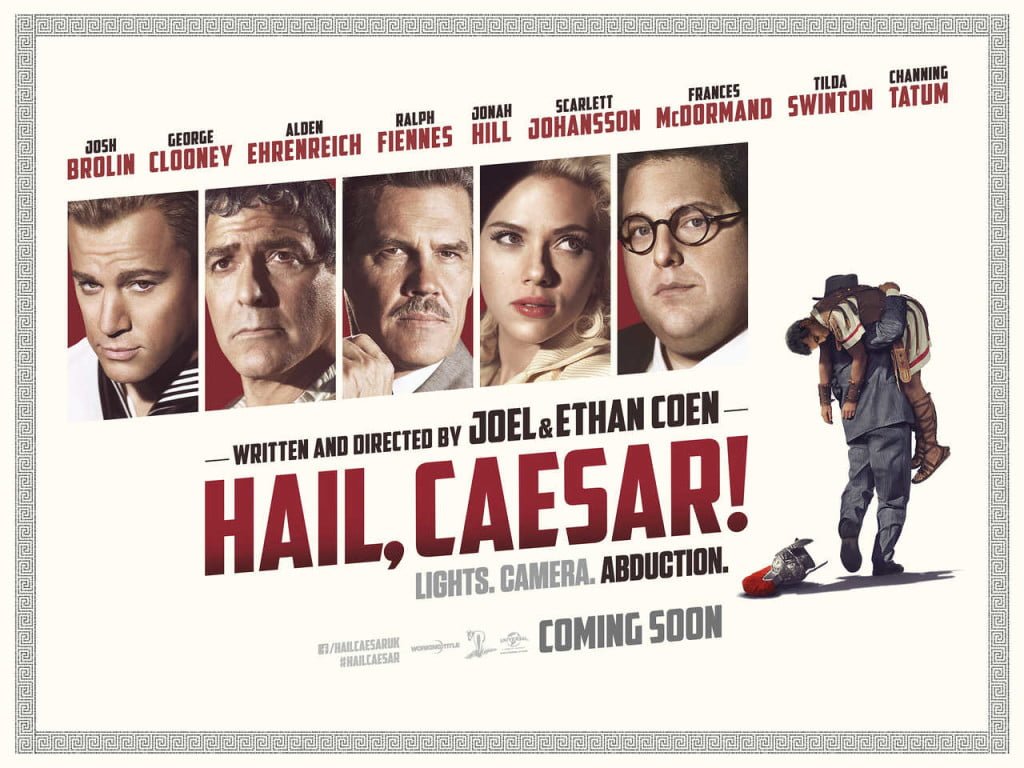Film review : Daniel Palmer on the Coen Brothers’ Hail, Caesar!
March 8, 2016

The Coen Brothers’ oeuvre is littered with initially baffling but inspired left turns. On the surface there may be none more pronounced than the jump from the frosty and oblique Inside Llewyn Davis (2013) to the visual exuberance of Hail, Caesar!. But for all the apparent stylistic and thematic differences, both films continue the wonderfully rich but enigmatic course the Coens have pursued since their critical and commercial apotheosis with No Country for Old Men (2007). Recent years have seen the Coens produce work whose complex inner life is revealed over the course of repeated viewings. But that is not to say that the Coens have succumbed entirely to subtext, as even their most inscrutable film, A Serious Man (2009), can be enjoyed as a comedy of manners. After over ten years in development, Hail, Caesar! seems designed to bridge the populist and the profound.
Eddie Mannix (Josh Brolin) is the no-nonsense head of production for Capitol Pictures: Mannix tries to keep the off-screen exploits of his contracted stars away from the attentions of feuding twin gossip columnists Thora and Thessaly Thacker (Tilda Swinton); and deal with the New York Office’s demand that western star Hobie Doyle (Alden Ehrenreich) broaden his appeal by appearing in a stuffy drawing room drama directed by the highly strung Laurence Laurentz (Ralph Fiennes), for which he is hopelessly miscast. All the while Mannix is pondering an offer from the Lockheed Corporation to ‘leave the circus’ and take up an executive position with them. But everything stops for Mannix when Baird Whitlock (George Clooney), the star of the studio’s latest Biblical epic, goes missing and Mannix receives a ransom note for $100,000 from a group calling itself ‘the future’.
The obvious point of comparison for Hail, Caesar! is Barton Fink (1991), not merely in its setting but the sense of inhabiting a world of artifice, of residing within a giant puzzle, of something unsettling lurking just below the surface; it is shot through with a screwball sensibility, but also something more enigmatic, giving it the feel of Last Year at Marienbad (1961) written by Billy Wilder. The Coens have always been more than mere sneering ironists, and Hail, Caesar! has a spiritual dimension that elevates it beyond the knockabout. The film is set in 1951, which is significant. This was the beginning of the end for the Golden Age of Hollywood: the major studios were being forced to divest their theatrical holdings, television was beginning to eat into cinema attendance and the shadow of the House Un-American Activities Committee hung over the film industry. Time is a constant motif, as is the sense of an epoch coming to an end, be it the Roman Empire or the studio system.
Of course, Hail, Caesar! also happens to be riotously funny and spot-on in its satire of this period – the meeting with the religious leaders is a particular comedic high point – having an affection for the period without tipping into sickly-sweet nostalgia for the ‘good old days’; there is an understanding that the Golden Age produced as much dross as magic. The Coens/Roger Deakins partnership can always be relied upon to yield stunning results; the legendary DP perfectly captures the cinematic tones of the era, while the screenplay brims with pithy dialogue. Hail, Caesar! can be enjoyed purely as a shaggy dog story in the vein of The Big Lebowski (1998), but it shares more with A Serious Man in the sense of the characters as vessels for a broader story. It may be the Coens’ most consistently funny film since The Big Lebowski and unashamedly zany in places, but there are allusions which point to something weightier at its core. You don’t reference Herbert Marcuse on a whim.
One of the joys of a Coens film is the casting, and Hail, Caesar! features an abundance of talent. Brolin delivers a sturdy, hard-boiled central performance which ties together the various narrative strands; it is the least showy but most crucial role in the ensemble cast. The Coens seem able to elicit something special from Clooney, and he delivers an inspired performance as the guileless Whitlock, a classic Coens stooge blustering his way through a situation he doesn’t understand. Ehrenreich is the film’s revelation as the witless hick who is hopelessly out of his depth; his interplay with Fiennes is joyously silly. Swinton is at her icy best as the Hedda Hopper-esque Thackers; while Scarlett Johannson and Channing Tatum are perfectly cast as a brassy Esther Williams-esque synchronised swimming starlet and a burly hoofer respectively, bringing gusto and vivacity to the musical numbers. Frances McDormand delivers a hilarious cameo as a grizzled editor, Fiennes is all clipped hostility, and Michael Gambon lends his distinctive timbre to a comically portentous narration.
A lot of critics seem to be discounting Hail, Caesar! as one of the Coens’ occasional palette cleansers, something akin to Burn After Reading (2008), in which they can let off some comedic steam following a difficult or downbeat production. But this is nowhere near as lightweight as the critical consensus would have you believe; on the surface this may be a zany screwball comedy, but delve deeper and Hail, Caesar! has much more to offer. Hail, Caesar! is a deftly constructed piece which has the aura of vintage Coens, and may come to sit amongst their very best as its intricacies come to be appreciated.
Follow Daniel Palmer on Twitter at @mrdmpalmer.
Filed under: Film, TV & Tech
Tagged with: alden ehrenreich, coen, eddie manix, George Clooney, ralph fiennes, tilda swinton

Comments